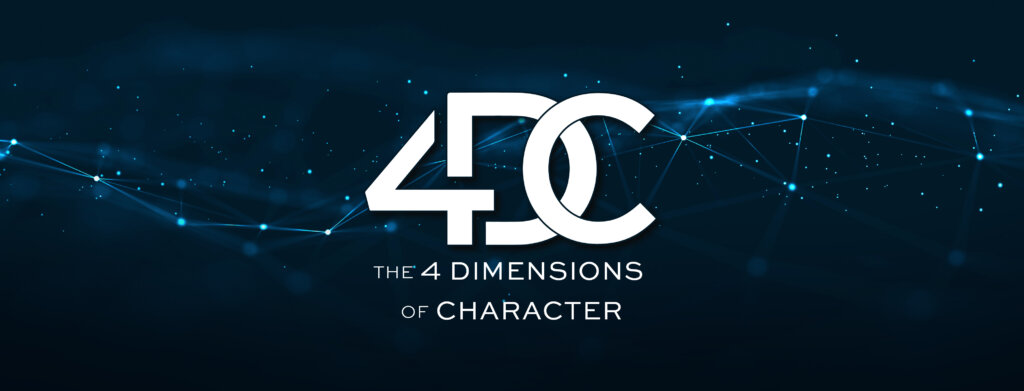Executive Podcast #267: The 4 Dimensions of Character

In this episode, we explore the four dimensions of character in leadership, the significance of being vulnerable and transparent in order to establish trust with team members, as well as the challenges of self-management and the need for leaders to prioritize effectively. You’ll learn the concept of teachability and the role it plays in demonstrating humility along with the value of courage in standing up for what is right and making tough decisions.
References:
Become a Maxwell Leadership Certified Team Member!
Download our Learning Guide for this podcast!
Perry Holley:
Welcome to the Maxwell Leadership Executive podcast, where our goal to help you increase your reputation as a leader, increase your ability to influence others, and increase your ability to fully engage your team to deliver remarkable results. Hi, I’m Perry Holly, a Maxwell leadership facilitator and coach.
Chris Goede:
And I’m Chris, executive Vice President with Maxwell Leadership. Welcome and thank you for joining Perry, and I really appreciate you being an avid listener, downloading this, sharing this with your team. We enjoy doing this. Perry brings content, and we’d love to banter back and forth for about 20 minutes on a leadership topic that’s relevant in organizations around the world that we have the privilege of serving, whether it’s coaching or delivering some training. Matter of fact, Perry is coming off of a couple of hours of virtual training this morning with one of our corporate clients. And so if you’re interested in learning more about how does that happen, how does that work, I want to encourage you to go to maxwellleadership.com/podcast. Then, if you’ll go down and click on this episode at the bottom of that, you’ll see a form. You can submit your information there, and our team will follow back up with you.
Chris Goede:
Well, today we’re going to dive into. We talk a lot about. We believe the foundational of Leadership is the ability to connect with people, level two in the five levels of leadership. Today we’re going to talk about maybe even a little bit deeper than just connecting with people about having a foundational leadership. And today’s title is the four Dimensions of character. I love this title. You’re always creating something new. Matter of fact, the lesson you were doing this morning was on creativity.
Chris Goede:
Is this a new content piece you’re working on?
Perry Holley:
It could be, but no. In this case, I ran across this while I was preparing a keynote for one of our deliveries for one of our clients, and I just loved it, and the client really loved it as much, so I thought I might bring it to the audience here. But it comes from a book called Derailed Five Lessons learned from catastrophic failures of leadership by a guy named Tim Irwin. I love Tim’s work here, and I just thought that we could just talk about how it applies to what we do. And I was a little nervous because it was published, like, ten years ago, but it’s just so relevant when you talk. A character is always relevant. And in the book, he kind of chronicles the collapse of high profile CEOs. You think, well, taking the negative side here, but understanding why would matter on that.
Perry Holley:
But according to Tim Irwin, the character can be broken down in these four dimensions that guard against being derailed in your leadership, which is why I glammed the four dimensions. We’ll talk more about it. But are authenticity, self management, humility, and courage all big?
Chris Goede:
I like where you said you go. I was a little hesitant. Right. It talks about the negative side of it. Oftentimes when I’m in a little bit of a rut or thinking about something, I will go to the opposite side and say, okay, well, what’s this look like? Well, I don’t want it to look like that. Right. As a leader, what does it need to be on the other side? As you were talking, this reminds me of a quote from Coach John wooden about character, where he says, be more concerned with your character than your reputation, because your character is what you really are, while your reputation is merely what others think you are. Right.
Chris Goede:
I thought that was so good. And John says, when a person has character, we will put our trust in them. It’s a natural progress. And when I think about character, I think know this is kind of what lives underneath our words, our facial expressions, our body language. It is what makes trust possible. And everyone that’s listening to this can say, oh, I immediately can kind of get an idea. Like, something intuitively with us tells us about their character. And that’s, in essence, what we’re saying right here.
Chris Goede:
It lives beneath everything that we’re showing to people is kind of our character, and it is a choice that we have, and it’s something that we can work on. And so I love the fact that we have these four things and that we’re going to dig into them, because I think we can improve in each one of these areas.
Perry Holley:
Yeah, let’s go quick, because the first one, authenticity. I love this word. I know in several presentations have a. There’s a Harvard Business review where they kind of qualities people want to. Followers want to see in their leader. And authenticity is always number one or number two. It’s really always very high in that I teach a lot around a word that makes a lot of people nervous called vulnerability. And many people, when I say, what do you think vulnerability means? They say, weak.
Perry Holley:
Weak. No, if you see it, it’s 100% courage. I always follow a lot about what Brene Brown, she’s a vulnerability researcher and says that vulnerability is the linchpin of trust, that when you are authentic, when you’re real, when you don’t come across as too perfect, you don’t have all the answers. And vulnerability, by the way, is things like, I don’t know three most unused words in leadership. I need help. I made a mistake. Things like that, that sell people that you’re real, you’re not perfect. And the key there is everybody knows you’re not perfect.
Perry Holley:
But if you act like you are, it’s not authentic and it kind of tears that down. What are your thoughts about leaders and vulnerability? Do you see this much?
Chris Goede:
So I don’t see it enough. You think about, even from just a flesh standpoint as human, we don’t want other people. I think about growing up, my mom would be like, hey, these are conversations that we’re keeping inside these walls. We’re not going to talk about it. As soon as we step outside and everybody gets out there and you act like you’re this perfect family, well, then you start dating and getting married and you have friends and you go, man, they’re just as dysfunctional as our. As our family. What if we were all just vulnerable and helped each other through those times? But it doesn’t happen. So I think we naturally grow up with a tendency not to allow that to happen.
Chris Goede:
And so the biggest challenge here is breaking down the barrier to know that it’s okay to be authentic with your people, to be vulnerable, to understand that you are going to make mistakes, and then just to apologize it apologize. Because in essence, not only is it good for you as a leader, but that’s what you want to model for your people themselves. You want to be able to do that. You and I read a lot of HBR articles, and oftentimes when we’re speaking, we’ll talk about the fact that EQ versus IQ and what all that looks like and how much time do leaders spend on that. In one of the studies we also reference at the same conversation is the number one attribute. After studying leaders, I think it was 200 leaders in this article. Around the world, different industries, different backgrounds, different all that number one was two times to. The second one was authenticity.
Chris Goede:
And if that’s the attribute that everybody’s looking for in a leader, and they’re saying that these top 200 leaders, which I don’t think you and I are on that list, I’m not sure why, is authenticity, then that’s what we should strive to do. And to your point, I love the word vulnerability, because that leads to authenticity. Greg Kegel shares quite a bit one of our executive coaches and facilitators that authenticity is a trust accelerator. Same thing. You can interchange those words. Authenticity and vulnerability is a trust accelerator. And so if we’re going to do that, we’re going to be able to increase trust.
Perry Holley:
What do you think keeps us. Because it makes. I mean, when I listen to you talk, duh, it’s like obvious, right? What keeps us from being more vulnerable, more authentic? Are we afraid? What? Pride, I think about what?
Chris Goede:
Pride. Ego.
Perry Holley:
Yeah, ego is what I thought.
Chris Goede:
Isn’t it interesting that a lot of people talk about the impostor syndrome, but we really don’t admit that we have the imposter syndrome. As I was just thinking about this back and forth, because my pride and my ego As a leader is like, oh, yeah. I mean, inside I’m like, man, I can’t do that. And then I stand up for. I got this. Yeah. Versus man. No, I mean, this is unchartered territories.
Chris Goede:
We’re going to figure this out together. I don’t know what I’m doing. You don’t know what you’re doing. But I do think it has a lot to do with the pride and the ego of leaders. And the longer you have led, maybe the more you have, quote unquote, accomplished as a leader. I think this becomes harder and harder.
Maxwell Leadership Certified Team:
Hey, podcast listeners, many of you listening right now would probably love the autonomy that comes with owning your own business or becoming a coach that helps other businesses succeed. Well, we have a phenomenal strategy where you are 100% in control of your own business, earning income on your own terms, and have access to the people, tools and resources you need to build a thriving leadership development business. When you become a Maxwell leadership certified team member, you join a global community of entrepreneurs led by our expert team of mentors and faculty, including John C. Maxwell. You’ll also get one of the top leadership certifications in the world next to your name, giving you the boost you need to get started. Visit us online Maxwellleadership.com/JoinTheTeam to find out more.
Perry Holley:
People come to us all the time and say, man, could you coach me on my. I want to be like you. You seem like you have it all together. I go, oh, what a joke. But we tend to, I tell people, it’s like you’re seeing the Perry show. It’s a stage act, and the curtain behind me is closed, and you can only see what I want you to see. I can make you think whatever I want to make you think. However, if I crack the curtain a little bit behind me and you can see part of the Backstage act, you’ll notice that I’m struggling just like you are.
Perry Holley:
I have ups and downs just like you do. I make mistakes just like you do. I have challenges just like you do. I don’t know the answers as much as you think I do. I’m always asking, but if I crack the curtain a little bit now, people say, I don’t want to reveal. I’m not saying take the curtain all the way back to the edges of the stage. You don’t have to show your ugly, dirty secrets and all that, but just letting people know that. I hear John, he said of you talking to people, and he talked about this in the 16 laws of communication.
Perry Holley:
You want people to say, me, too? Not so what if you’re putting on a show and you’re not authentic, they’ll kind of say, so what? Because they know you’re not. But if they see you kind of coming true. But here’s what I’m showing it. They go, oh, me too. Now, you made a connection.
Chris Goede:
That’s right.
Perry Holley:
To do that.
Chris Goede:
That’s right.
Perry Holley:
All right, number two is self management. Oh, my gosh. I love this. One is, can you manage your emotions, your thoughts, your behaviors in a way that is productive and effective with people? We talk about this all the time, but that people are watching you how often? All the time. They’re watching you all the time. And what are they watching for? They’re watching for your actions. Do your words match what you say? Do your actions match your words? You’re watching for your reactions. How do you handle bad stuff? Do you blow up? Do you get angry? Do you get judgmental actions, reactions? They watch your interactions.
Perry Holley:
How do you talk to people? How do you talk to people above you in the organization? Do you talk the same to people below you in the organization? Or do you show more respect up and less respect down? They’re watching this all the time. Your behaviors in general, they want to know. They’re trying to see if you lead yourself. And we talk about this level two into five levels. It’s called permission, is that they’re watching you to say, am I going to give you permission to influence me? Give you permission to lead me? So when you’re looking at people, I always ask this, but what demonstrates someone manages themselves well? Are there signs that give it away?
Chris Goede:
The first thing that comes to mind is, are they self aware, and what are they doing about that? That’s something that you and I talk a lot about, not only on this podcast, but also with leaders that we’re coaching around the world. That is something that I think ties directly into this self management. And you’re looking at, how are they managing their priorities? How are they managing their time? What are they focused on? Are they communicating one message about what’s important and then doing something else? What does that time look like? For example, we work in an environment that is a leadership bubble and a personal growth bubble, and we talk about this all the time. And then when you get down to it and you ask maybe individuals inside our organization, how are you managing your time around personal growth? Well, if you’re talking about it and then you’re not doing it and you’re not sharing it, how do people actually know? And again, this goes back to character. Now we’re leading us back to that. So I think that they are watching. I love this. You put this in my notes.
Chris Goede:
I love this statement where you said, there are many things that give away how well you manage you. Right? That’s what we’re talking about. So not only self management is the same term, but I love how do you manage you. And John has taught both of us over the years that we’re the hardest person to lead.
Perry Holley:
And if you can’t lead you, if.
Chris Goede:
We can’t lead me, right, then, then you’re going to all of a sudden get out here. And then this ties back even into being authentic, where you’re the first one we just talked about, you can’t really be authentic if you get up and say, man, you know what? I did my quiet time seven days this week out of seven. Everybody’s going, well, I’m a failure. But did he really?
Perry Holley:
They say, so what?
Chris Goede:
Yeah, they say, so what? So I love that.
Perry Holley:
Number three, the dimensions of character, is humility. Man, this is hitting close. You’re thinking that willingness to admit mistakes, learn from others, put the needs of the organization above your own. I always think of humility as an others orientation. I’m not oriented toward me and mine. I’m outwardly looking. One thing I look for in myself, questioning whether I’m having humility, and especially in others, is the word teachableness. I just find that teachable leaders tend to.
Perry Holley:
You used ego and pride a while ago. I think you kind of push ego and pride down. When you say, I’m teachable, what does that actually mean? That they’re humble because they don’t feel that they have all the answers. They are open to the fact that that other’s orientation is, I’m open to. You might be able to teach me something, you might be able to bring something, and I don’t have to play the fact that I’ve been doing this a long time. I know a lot of things. Yeah, but I don’t know everything. And so that constant reminder of keeping my personal power under control in the situation say, that’s humility to me.
Perry Holley:
What do you think?
Chris Goede:
Yeah, this is something that I love the word teachable. It’s interesting because we’re going off of these four dimensions from the book. Ten years ago, you were worried about it being ten years ago. As we’re talking, I find us replacing those words with, what are our buzzwords right now. Right. With vulnerability and versus authenticity. Teachable. I love this word.
Chris Goede:
And I was having a conversation a couple of weeks ago with Mark Cole, our CEO, and we were talking about some executive level leaders he’s thinking about. And I said to him, what are the attributes? Like, what are you looking for right here? And he said, oh, it’s very simple. It comes down to just a couple of things. And at the top of that list is, are they coachable and are they responsible? Someone that has that type of humility that at the executive level has led things maybe bigger than anybody on a team. Are they still teachable? Are they still coachable? And are they responsible for what their KPIs are? Are they going to take responsibility for it, or are they going to deflect it for excuses? And so it got me thinking as we were going through these notes, I was thinking, man, if that’s important at that level, then we should start our career at that and thinking about, how do we become teachable? Which goes into some things that you talk about being curious, what is that in conversations? And having humility is a superpower because it allows you to step back and to show that you genuinely value others opinions and others perspectives. And you can talk through that and have that humility at any level in leadership is a tremendous character when it comes to the four dimensions that we’re talking about.
Perry Holley:
Yeah, I think that idea of questioning about teaching, you said we should start our careers that way. I’m thinking, should I be teaching my team these things, teaching them what teachableness looks like, teaching them what humility looks like, teaching them what character looks like, teaching them what authenticity looks like? Also, in my home, am I demonstrating these things in my home, or am I acting like the all knowing father and husband, or am I teachable at home? There’s a lot of smart people in my house. Could I humble myself there, too? How does that show up? It’s a magnet. People are drawn to authentic, teachable, humble people. It’s kind of rare in today’s society, and you notice it right away. Dimension number four is courage. Thought this was an interesting ad. When you think about character and where does courage play? And he talks about it being the ability to take risk, make difficult decisions, stand up for what’s right, even in the opposition of adversity.
Perry Holley:
And I think about that in my own life, and we produce a lot of things. I create a lot. Having the courage to present my ideas, to present my creativity that anybody can take a shot at, but also in a leadership aspect about addressing problems, stepping up and standing up for things that might not be popular, taking a stand based on your character in a world that might not admire that so much anymore. And so insecure leaders often rely on control. They micromanage the people. They don’t give power to others. They don’t empower. They kind of hold power.
Perry Holley:
But I think courageous leaders, they trust others to accomplish things because we’ve put the work in, in advance to get that done. So insecure leaders don’t trust or invest in others. They don’t even trust themselves, really. So I think this idea of courage is not easily seen as invigorators. Maybe it is, but what do you think about courage?
Chris Goede:
Yeah, I don’t think it is something that’s natural. I think we care a lot about what other people think and do things, and so we don’t have enough courage at times to kind of step out on that thing. It comes back to the impostor word I used a little while ago. I heard Patrick Lincione talk about once, common ways leaders express courage. There’s four of them here, and the first one is taking a public stand for what’s right, not being right, but what is right against what maybe is wrong. The second one is interpersonal confrontation, the ability to confront a person. I was having a conversation with a leader a week or so ago, and we were talking about the word triangulation and how that affects the culture of a team, of an organization. And instead of people going and confronting, let’s say, instead of me coming to you and saying, hey, Perry, I want to talk to you about this and having the courage to do that, instead, I go and talk to Jake about you without you being present, then you’re creating this negative triangulation around it.
Chris Goede:
And so having the courage to be able to have those types of conversations, I think, is huge. The third one he talks about is silence within attacks. The ability to refrain from defending your turf or reputation will attack. And then finally, the fourth one there, he says, is self honesty is being authentic, which we talked a lot about today, about your flaws and your shortcomings. So I love this. As we wrap up, one of the things we try to do is bring to you things that are, things that you can work on, that are simple but not easy. And I think character is one of the most important elements of leadership. I think it determines and can be determined by, again, not only how you manage your time and manage that, but what do you pay attention to? Who are you spending time with? How do you receive the feedback and whether or not you can then make good, effective decisions.
Perry Holley:
Fantastic. Well, I know character is not built in a day. It’s built day by day. So working on these areas, I thought were good. By the way, Tim Irwin offers in the book some assessments and some evaluation, some things you can do to kind of test yourself if you choose to do that. He had some resources that are available there. We’re grateful you spend this time with us. If you want more information, a learner’s guide, you want more information about our offerings.
Perry Holley:
If you’d like to leave us a question or a comment, you can do all that at MaxwellLeadership.com/Podcast. We love hearing from you, and we’re very grateful you’d spend this time today. That’s all from the Maxwell Leadership executive podcast.
To be a Successful Leader, You Need Feedback on Your Leadership.
We’re excited to announce our new and improved Organizational Effectiveness Survey (OES). The OES gathers feedback from employees to give leaders and management the knowledge and action plans needed to develop a more effective and productive work environment. Our new version measures 4 areas of your business: Leadership, People, Strategy, and Performance.













Be the first to comment on "Executive Podcast #267: The 4 Dimensions of Character"